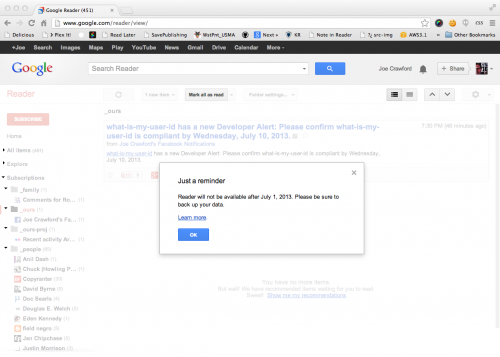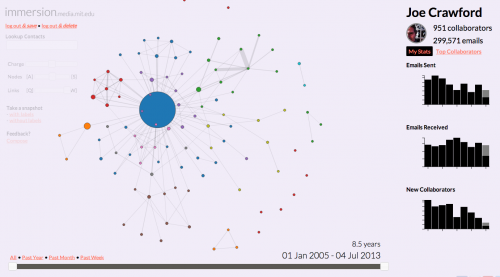
On July 1, Google Reader does indeed close. Reader has been a valuable tool for me for a long time. In 2006, I said:
Holy cow but the new Google Reader is pretty darn good. Fully worth using to read your RSS and Atom feeds.
And that same year, I wrote an extended piece that included how I used Google Reader. Time Time Time; Experts I Treasure is about how I manage my own time, and how useful GReader was to me at the time. Here’s a relevant excerpt:
One thing I’ve done is started reading RSS and Atom feeds again. I use Google Reader to organize and read blogs and anything with syndicated content. This is a great way to keep track of things, but to be “the decider” when it comes to when I look at them. I organize them into categories: ours (blogs leah and I work on or maintain, flickr feeds of ours, etc), people (blogs in a voice more or less by one person), writers.laish (blogs by people in leah’s nascent writer’s group), forsale (craigslist feeds for “for sale” items), group (blogs like metafilter or boingboing, which don’t really have a single person at the helm), jobhunt (feeds for job postings), links (link blogs like waxy’s links and larger link sites like fark), and sandiegobloggers (a holdover which i don’t beat myself up about if i don’t read, there are many). For several months I simply gave up reading blogs or keeping up with feeds, because I was so busy with work, but I ended up even more frustrated because there were people and information sources that I ended up checking anyway, and doing it ad hoc took more time than simply reading them in an RSS reader. I tried bloglines for about a minute. And I had been using NetNewsWire, which is great software, but is not nearly as mobile as I am. When Google Reader got good recently, I jumped in and have not looked back. It’s all very “Web 2.0” of me, I’m sure.
Since December, 2010 I’ve been using Reeder App to read my Google Reader feeds. It has been a tremendously worthwhile purchase at $2.99. Reeder is an excellent frontend to Google Reader. I was using Reeder originally on my Mom’s iPod Touch after she died. Reeder was great. And I’ve been glad it kept working and transferred over when Leah and I got iPhones.
I’m disappointed by Google Reader being shut down. What I’ve done now is install Tiny Tiny RSS on a domain I run and have started, tentatively using it as a replacement for Google Reader. At this point I’ll no longer be able to use Reeder App on my phone. None of the solutions out there appeal to me. Having been burned once now, it’s hard to get behind the other options. What I’m looking for now is to be able to use a service I control as a front end for Reeder App.
RSS is critical infrastructure for the web, and has been for a long time. Some of my favorite projects have been pages powered by RSS. Twitter recently killed all support for RSS or Atom feeds. It’s a horrible disservice they’ve done, but we live in an age where web giants no longer respect inter-operative technologies the way some once did. For depressing reading on this, read Battle for the planet of the APIs by Jeremy Keith.
It’s all incredibly frustrating.
I’ll leave you with a J.M. Barrie allusion in a tweet I recently tweeted:
I still believe in RSS, but we still have work to do to get back the web we lost.
Addendum July 2, 2013. The shutdown is complete:

Thank you for stopping by.
Google Reader has been discontinued.
We want to thank all our loyal fans. We understand you may not agree with this decision,
but we hope you’ll come to love these alternatives as much as you
loved Reader.
Sincerely,
The Google Reader team
Frequently-asked questions
-
What will happen to my Google Reader data?
All Google Reader subscription data (eg. lists of people that you follow, items you
have starred, notes you have created, etc.) will be systematically deleted from
Google servers. You can download a copy of your Google Reader data via Google Takeout until 12PM PST July 15, 2013.
-
Will there be any way to retrieve my subscription data from Google in the future?
No — all subscription data will be permanently, and irrevocably deleted. Google will
not be able to recover any Google Reader subscription data for any user after July
15, 2013.
-
Why was Google Reader discontinued?
Please refer to our blog
post for more information.
Goodbye, old friend.




